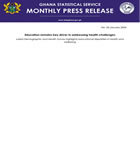
Related Press Release

“Education is a human right, a public good, and a public responsibility” as stated by UNESCO. However, according to the 2021 Population and Housing Census, 5.4 million persons 6 years and older, representing one in every five, have never attended school. Findings from the just released 2022 Ghana Demographic and Healthy Survey Report present differences by educational attainment in multiple measures of population health and wellbeing, thus highlighting the importance of ensuring education for all. Women’s education improves maternal and child health. Under-5 mortality for children whose mothers have no education (52 deaths per 1,000 live births) is almost three times higher than for children whose mothers have secondary education or more (19 deaths per 1,000 live births). Among women 15 to 49 years who had a live birth in the previous two years, one in every four females (26.5%) with no education delivered at home, which is almost 18 times the percentage of females with more than secondary education (1.5%). Less than half (41.8%) of children 12 to 23 months whose mothers have no education have been fully vaccinated1 according to the national schedule; about half the percentage of children whose mothers have secondary education or more (82.0%). The frequency of alcohol consumption decreases with the level of education. One in every four males (26.4%) 15 to 49 years with no education reported drinking alcohol daily or almost daily, about three times the percentage of males with more than secondary education (9.0%). The percentage of females in this age range with no education who reported drinking alcohol daily or almost daily (11.6%) is over five times higher than that of women with more than secondary education (2.1%). The likelihood of experiencing violence for females 15 to 49 years similarly decreases with educational attainment with females with no education having the highest percentage that have experienced physical (15.1%) and sexual (7.1%) violence, with rates about twice that of women with more than secondary education. Reporting positive attitudes to wife beating declines with education for both males and females. About one in every three women (35.6%) 15 to 49 years with no education agree that a husband is justified in hitting or beating his wife2, almost eight times higher than women with secondary education or more (4.5%). Among men, the percentage of males in this age range with no education who agree wife beating is justified (27.9%) is about seven times higher than men with secondary education or more (3.8%). Access to mass media and ICT increases with educational attainment. Half (52.2%) of females 15 to 49 years who have no education do not access mass media3 weekly, more than twice the percentage of women with more than secondary education (14.0%). Among males with 15 to 49 years with no education, almost half (44.8%) do not access media weekly, compared to males with more than secondary (12.7%) education. Further, one in every ten (11.0%) females and two in every 10 (22.0%) males 15 to 49 years with no education did not use the internet in the previous 12 months compared to over nine in every 10 for those with secondary education or more. International Day for Education is Commemorated annually on 24th January to raise awareness of the transformative power of education for development. The theme for 2024 is “Learning for lasting peace”. The Ghana 2022 Demographic and Health Survey report and microdata can be downloaded from www.statsghana.gov.gh. Disaggregated data on education from the 2021 Population and Housing Census can be accessed directly from the GSS StatsBank: https://statsbank.statsghana.gov.gh.